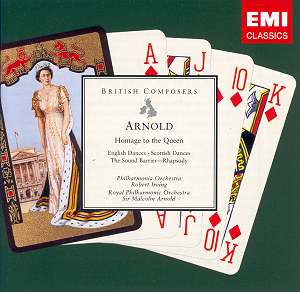Time has not been tender to the composerís RPO recording of The
Sound Barrier rhapsody and the results in this voluptuous
and grandiloquent work are scrawny. That said, you can soon enough
listen past the grittiness and rasp. Itís clearly a significant
document in the composerís discography so it is good to have it
but its interest is primarily for Arnold specialists.
Robert
Irvingís name is largely forgotten these days. He was born
in Winchester on 28 August 1913 and died there on 13 September
1991. He found transient fame as a ballet conductor although
going by the breathtaking clip at which hew takes the Vivace
of the first set of English Dances (tr. 3) this did not
cramp his orchestral style in the studio. He studied at the
RCM with Constant Lambert (whose Horoscope suite he recorded)
and Malcolm Sargent. Just after World War II he landed the†
principal conductor job with Sadler's Wells Ballet and was
there until 1958. He then shipped off to the USA as music
director of the New York City Ballet. He remained there until
retirement in 1989. His input into the major Stravinsky season
in 1972 involved coverage of all 22 of the composerís ballets.
He also worked with Martha Graham in her companyís New York
seasons 1960-1965, 1974-1977. He guest conducted with the
Royal Ballet from 1978.
The
scene having been set we can hear almost an hour of Arnoldís music
conducted by Irving. And by the way despite being older these
Irving recordings sound in very good heart; certainly better than
the Sound Rhapsody. Thereís just that patina of edge on
the strings but itís really modest. As you will have gathered,
Irving directs brawny and rollicking vigorous performances of
the Eight English Dances; not that he does colour and pace
with lissom pastoral poetry when required as in the typical Grazioso
(tr. 8) where the template was perhaps George Butterworthís Banks
of Green Willow. Irving would have encountered these dances
as the Kenneth Macmillan ballet Solitaire in June 1956.
Arnold added a Sarabande and a Polka †for Solitaire.
Surprisingly this was not recorded by Irving but can be heard
directed by the composer in the 1960s on EMI and again in the
1980s on Lyrita. The disc closes with a rapt and gaudy performance
of the Four Scottish Dances. This deserves to be counted with
the composerís own recordings on Phoenix and Lyrita. While the
uproarious dissenting curse of the tartan hangs over much of this
music the Allegretto ranks as one of the worldís most meltingly
beautiful treasures. If you donít know it you owe it to yourself
to hear it. Irving and the Philharmonia turn in what must be one
of the most explosive and virtuoso performances ever of the final
Con Brio.
I would take with
a pinch of salt any suggestion that his studio recordings show
any tendency to slowness to accommodate the demands of dance.
Where it is almost visually apparent is in the major ballet
score Homage to the Queen. This is a most inventive 45
minute piece and is by no means a sequence continuing the English
Dances. The movements are: Prelude and Opening Scene,
Earth, Water, Fire, Air and Finale.
The writing is at times lissom and full of grace and in this
mode recalls Barberís underrated dance suite Souvenirs which
would make a superb concert partner for Homage. Then
again the Fire section rattles and rages with fury amid
whooping horns and abrasive percussion, mechanistic or threateningly
stilled. Is it any wonder that some of the writing recalls Arthur
Bliss, that other master of English ballet music.
With a fascinatingly
inventive major ballet score and rapturously performed recordings
of the dances this is ranks high in the Arnold treasury.
Rob Barnett


